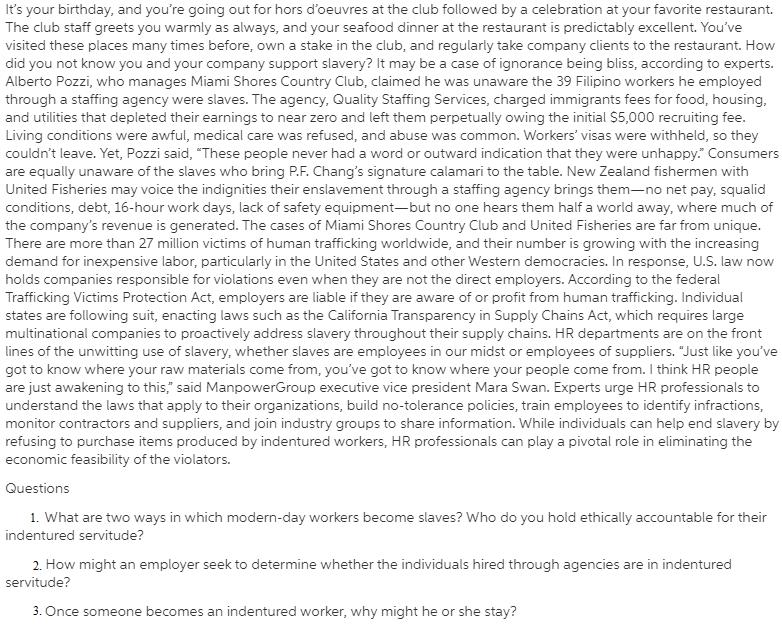It's your birthday, and you're going out for hors d'oeuvres at the club followed by a celebration at your favorite restaurant. The club staff

It's your birthday, and you're going out for hors d'oeuvres at the club followed by a celebration at your favorite restaurant. The club staff greets you warmly as always, and your seafood dinner at the restaurant is predictably excellent. You've visited these places many times before, own a stake in the club, and regularly take company clients to the restaurant. How did you not know you and your company support slavery? It may be a case of ignorance being bliss, according to experts. Alberto Pozzi, who manages Miami Shores Country Club, claimed he was unaware the 39 Filipino workers he employed through a staffing agency were slaves. The agency, Quality Staffing Services, charged immigrants fees for food, housing, and utilities that depleted their earnings to near zero and left them perpetually owing the initial $5,000 recruiting fee. Living conditions were awful, medical care was refused, and abuse was common. Workers' visas were withheld, so they couldn't leave. Yet, Pozzi said, "These people never had a word or outward indication that they were unhappy. Consumers are equally unaware of the slaves who bring P.F. Chang's signature calamari to the table. New Zealand fishermen with United Fisheries may voice the indignities their enslavement through a staffing agency brings them-no net pay, squalid conditions, debt, 16-hour work days, lack of safety equipment-but no one hears them half a world away, where much of the company's revenue is generated. The cases of Miami Shores Country Club and United Fisheries are far from unique. There are more than 27 million victims of human trafficking worldwide, and their number is growing with the increasing demand for inexpensive labor, particularly in the United States and other Western democracies. In response, U.S. law now holds companies responsible for violations even when they are not the direct employers. According to the federal Trafficking Victims Protection Act, employers are liable if they are aware of or profit from human trafficking. Individual states are following suit, enacting laws such as the California Transparency in Supply Chains Act, which requires large multinational companies to proactively address slavery throughout their supply chains. HR departments are on the front lines of the unwitting use of slavery, whether slaves are employees in our midst or employees of suppliers. "Just like you've got to know where your raw materials come from, you've got to know where your people come from. I think HR people are just awakening to this," said ManpowerGroup executive vice president Mara Swan. Experts urge HR professionals to understand the laws that apply to their organizations, build no-tolerance policies, train employees to identify infractions, monitor contractors and suppliers, and join industry groups to share information. While individuals can help end slavery by refusing to purchase items produced by indentured workers, HR professionals can play a pivotal role in eliminating the economic feasibility of the violators. Questions 1. What are two ways in which modern-day workers become slaves? Who do you hold ethically accountable for their indentured servitude? 2. How might an employer seek to determine whether the individuals hired through agencies are in indentured servitude? 3. Once someone becomes an indentured worker, why might he or she stay?
Step by Step Solution
3.43 Rating (166 Votes )
There are 3 Steps involved in it
Step: 1
1Ways in which modern workers become slaves are by being forced to work through coerci...
See step-by-step solutions with expert insights and AI powered tools for academic success
Step: 2

Step: 3

Ace Your Homework with AI
Get the answers you need in no time with our AI-driven, step-by-step assistance
Get Started


